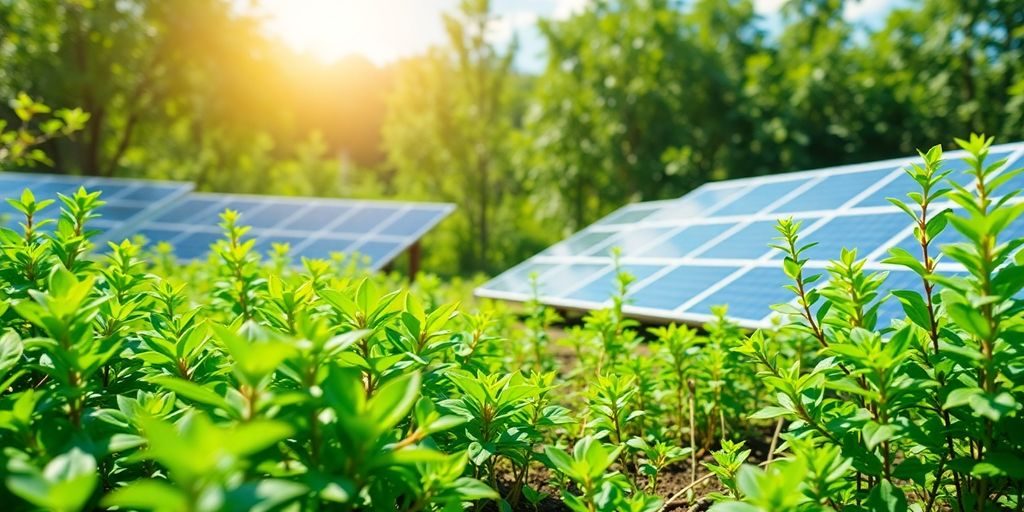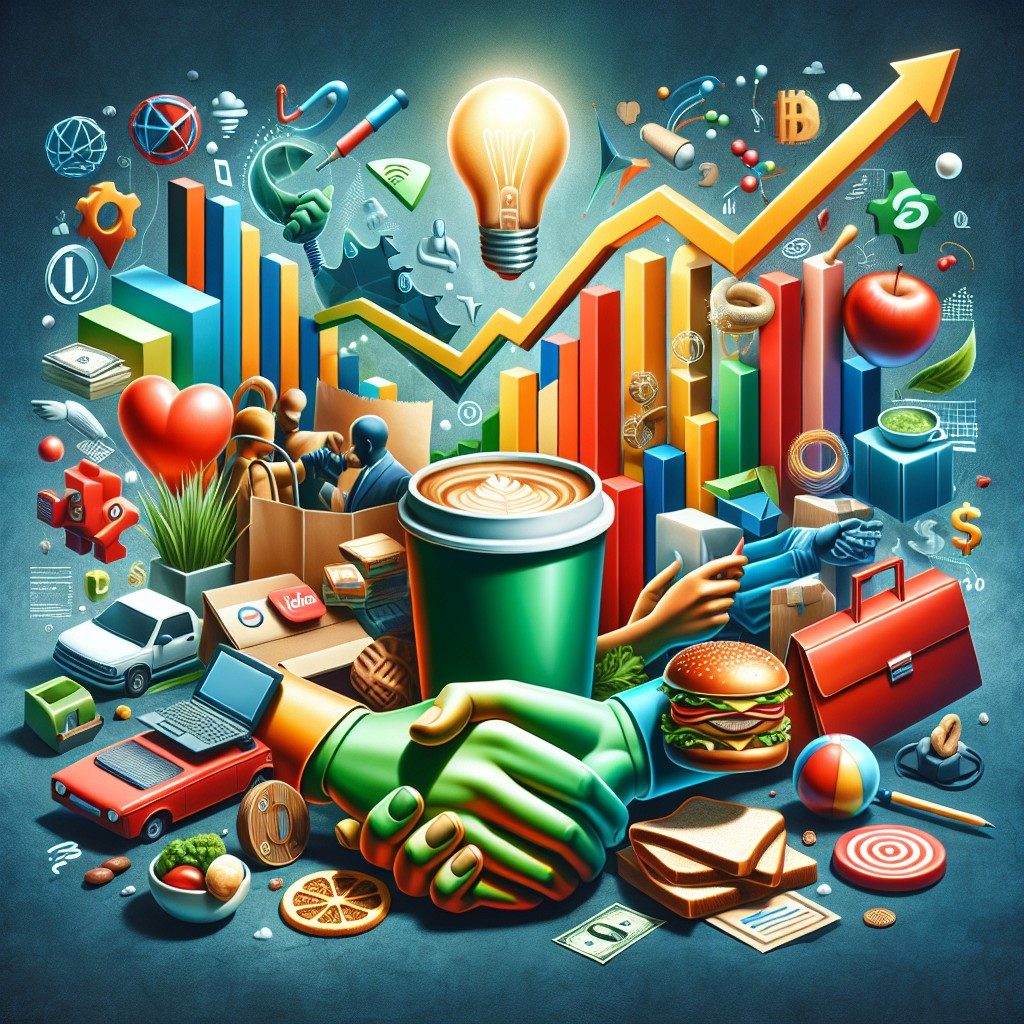Startup-uri care promovează sustenabilitatea în afaceri

In recent years, sustainable startups have emerged as a beacon of hope in the business world. These companies focus on eco-friendly practices, aiming to reduce their environmental footprint while promoting social responsibility. This article explores various innovative startups that are making waves in sustainability, showcasing their models, technologies, and impacts on communities. From green tech to sustainable fashion, there’s a lot happening in the world of sustainable businesses.
Key Takeaways
- Sustainable startups are crucial for reducing environmental impact.
- Innovative business models like the circular economy are gaining traction.
- Technology plays a significant role in promoting sustainability.
- The fashion industry is shifting towards ethical practices and recycling.
- Community involvement is key to successful sustainability projects.
Innovative Sustainable Startups
It’s exciting to see so many new businesses focused on sustainability. These startups aren’t just about making a profit; they’re actively trying to make the world a better place. From eco-friendly products to innovative services, they’re showing that business can be a force for good. The rise of these ventures signals a significant shift in how we approach commerce, prioritizing environmental and social responsibility alongside financial success.
Examples of Successful Green Startups
There are some really cool startups out there making waves. Take Infinium, Zum, and Copper, for example. They’ve all been recognized for their contributions to environmental solutions environmental solutions. It’s inspiring to see companies tackling big problems with creative ideas. Here are a few more examples:
- Renewable Energy Solutions: Companies developing new solar panel tech or wind energy systems.
- Sustainable Packaging: Startups creating biodegradable or compostable packaging materials.
- Upcycled Products: Businesses that transform waste materials into new, useful items.
Impact on Local Communities
These startups often have a direct, positive impact on their local communities. They create jobs, support local suppliers, and promote sustainable practices. It’s more than just business; it’s about building a stronger, more resilient community.
By focusing on local needs and resources, these startups help to create a sense of ownership and investment in sustainability. This approach not only benefits the environment but also strengthens the social fabric of the community.
Future Trends in Sustainability
Looking ahead, there are a few key trends to watch. We’ll likely see more emphasis on the circular economy, with businesses designing products for reuse and recycling. Also, expect to see more tech-driven solutions, like smart energy management systems and sustainable supply chain solutions. Here are some trends:
- Increased use of AI: For optimizing resource use and reducing waste.
- Focus on carbon neutrality: More companies aiming to offset their carbon emissions.
- Growing demand for transparency: Consumers wanting to know the environmental impact of products.
Eco-Friendly Business Models
It’s not just about feeling good; it’s about smart business. More and more companies are realizing that going green isn’t just a trend, it’s a better way to operate. It can save money, attract customers, and even boost employee morale. Let’s explore some models.
Circular Economy Principles
The circular economy is all about keeping resources in use for as long as possible, extracting the maximum value from them while in use, then recovering and regenerating products and materials at the end of each service life. This contrasts with the traditional linear economy, which follows a ‘take-make-dispose’ model. Think about companies that lease products instead of selling them, or those that design products for easy disassembly and recycling. It’s a fundamental shift in how we think about consumption and waste.
- Product as a Service (PaaS) models
- Design for Disassembly
- Closed-Loop Recycling Systems
Zero Waste Initiatives
Zero waste is more than just recycling; it’s a philosophy and a design principle. It aims to eliminate waste entirely, not just divert it to landfills. This involves rethinking product design, packaging, and even business operations. Companies are implementing strategies like reducing packaging, using reusable containers, and composting food waste. It’s about minimizing the environmental impact of every aspect of the business. Consider starting a sustainable fashion store to promote this initiative.
Zero waste initiatives often require a complete overhaul of existing systems. It’s not always easy, but the long-term benefits, both environmental and economic, are significant. It requires commitment from everyone in the organization, from the top down.
Social Enterprises and Sustainability
Social enterprises are businesses that prioritize social and environmental impact alongside profit. They address social problems or needs through a business model. Many social enterprises focus on sustainability, such as providing eco-friendly products or services, or creating jobs in underserved communities while promoting environmental stewardship. It’s about using business as a force for good. For example, a company that produces goods with 100% recycled raw materials would be considered a green business.
Here’s a simple comparison:
| Feature | Traditional Business | Social Enterprise |
|---|---|---|
| Primary Goal | Profit | Social/Environmental Impact |
| Profit Use | Owner/Shareholder | Reinvested in Mission |
| Impact Measurement | Financial Metrics | Social/Environmental Metrics |
Technology and Sustainability
Green Tech Innovations
Technology is a game-changer when it comes to sustainability. It’s not just about fancy gadgets; it’s about finding smarter ways to use resources and reduce waste. Green tech innovations are at the forefront of this movement, offering solutions that range from renewable energy systems to advanced materials. Think about solar panels becoming more efficient, wind turbines getting smarter, and batteries that can store more energy for longer. These advancements are making sustainable practices more accessible and affordable for businesses of all sizes.
- Smart grids that optimize energy distribution.
- Water purification technologies that reduce water waste.
- Precision agriculture techniques that minimize fertilizer use.
The integration of technology into sustainability efforts is not just a trend; it’s a necessity. Businesses that embrace these innovations are not only reducing their environmental impact but also positioning themselves for long-term success in a world that increasingly values sustainability.
Sustainable Supply Chain Solutions
Supply chains can be a major source of environmental impact, but technology is helping to change that. Sustainable supply chain solutions are using data analytics, blockchain, and other technologies to track products from origin to consumer, ensuring transparency and accountability every step of the way. This allows businesses to identify and address inefficiencies, reduce waste, and ensure that their suppliers are adhering to sustainable practices. It’s about creating a system where environmental responsibility is built into the very fabric of the supply chain.
Smart Energy Management Systems
Smart energy management systems are revolutionizing how businesses use energy. These systems use sensors, data analytics, and automation to monitor energy consumption in real-time, identify areas of waste, and optimize energy usage. This can lead to significant cost savings and a reduced carbon footprint. It’s about making buildings and operations more efficient and responsive to changing energy needs. For example, a smart system might automatically adjust lighting and temperature based on occupancy and weather conditions, ensuring that energy is only used when and where it’s needed.
Here’s a simple example of how energy consumption might be tracked:
| Area | Baseline Consumption (kWh) | Optimized Consumption (kWh) | Reduction (%) |
|---|---|---|---|
| Lighting | 500 | 350 | 30 |
| HVAC | 1200 | 900 | 25 |
| Equipment | 800 | 600 | 25 |
| Total | 2500 | 1850 | 26 |
- Predictive maintenance to reduce equipment downtime and energy waste.
- Automated building controls for optimized energy usage.
- Real-time energy monitoring and reporting for better decision-making.
Sustainable Fashion Initiatives
The fashion industry is often criticized for its environmental impact, but things are changing. More and more brands and designers are embracing sustainable practices, and consumers are starting to demand it. It’s not just a trend; it’s a necessary shift towards a more responsible way of doing business. Let’s explore some key areas where sustainable fashion is making a difference.
Ethical Sourcing Practices
One of the biggest issues in fashion is where materials come from. Traditional cotton farming, for example, uses a lot of water and pesticides. Ethical sourcing focuses on using materials that are better for the environment and the people who produce them. This includes things like organic cotton, recycled fibers, and innovative materials like biofabric startups that are grown in a lab. Transparency is key – brands need to be open about their supply chains so consumers can make informed choices.
Recycling and Upcycling in Fashion
What happens to clothes after we’re done with them? Too often, they end up in landfills. Recycling and upcycling are ways to give old clothes a new life. Recycling involves breaking down old garments into fibers that can be used to make new fabrics. Upcycling takes existing materials and transforms them into something of higher value. Think turning old jeans into a stylish jacket or using discarded fabric scraps to create unique accessories. It’s all about reducing waste and creating something beautiful from what already exists. When designing your own products, think about their purpose when they are no longer used.
Consumer Awareness and Education
Ultimately, sustainable fashion depends on consumers making conscious choices. Brands have a responsibility to be transparent and provide information about their products, but consumers also need to be educated about the impact of their purchases. This includes understanding things like the environmental cost of fast fashion, the importance of sustainable pet supply company, and how to care for clothes so they last longer. By being informed and making thoughtful decisions, consumers can drive demand for more sustainable practices in the fashion industry.
It’s not just about buying "green" products. It’s about changing our mindset and embracing a more mindful approach to consumption. We need to ask ourselves: Do I really need this? Where did it come from? How long will it last? By asking these questions, we can make choices that are better for ourselves, the planet, and the people who make our clothes.
Food Industry Sustainability

The food industry has a huge impact, and it’s not always a good one. From the resources it takes to grow food to the waste it generates, there’s a lot to consider when talking about sustainability. It’s not just about organic labels anymore; it’s about rethinking the entire system. I think the food industry is at a turning point, where sustainability is becoming a core value, not just a marketing tactic.
Plant-Based Alternatives
Plant-based alternatives are gaining serious traction. It’s not just tofu anymore; we’re talking about sophisticated products that mimic the taste and texture of meat and dairy. I’ve tried some of these, and honestly, some are surprisingly good. The environmental impact of raising livestock is significant, so shifting towards plant-based options can make a real difference. It’s also about accessibility and affordability – making these options available to everyone, not just those who can afford premium products. European startups are leading the charge in this area.
Local Sourcing and Organic Farming
Local sourcing and organic farming go hand in hand. Buying local reduces transportation emissions and supports local farmers. Organic farming practices minimize the use of harmful pesticides and fertilizers, which is better for the environment and our health. I try to hit up the farmer’s market when I can, but it’s not always easy.
Here’s a quick look at the benefits:
- Reduced carbon footprint
- Support for local economies
- Healthier produce
- Better soil health
Waste Reduction Strategies
Food waste is a massive problem. A lot of food gets wasted before it even reaches our plates. Implementing effective waste reduction strategies is crucial. This includes improving storage and transportation methods, as well as finding creative ways to use food scraps. Composting is a great option for consumers, but businesses need to think bigger.
Reducing food waste isn’t just about being environmentally conscious; it’s also about saving money. Businesses can improve their bottom line by minimizing waste, and consumers can save money on their grocery bills. It’s a win-win situation.
Green Consulting Services

More and more businesses are realizing that sustainability isn’t just a nice-to-have, it’s a must-have. But figuring out how to become more sustainable can be a real challenge. That’s where green consulting services come in. They help businesses of all sizes identify areas where they can reduce their environmental impact and improve their bottom line. It’s not just about hugging trees; it’s about smart business.
Advising Businesses on Sustainability
Green consultants work with companies to develop and implement sustainability strategies. This can involve anything from conducting environmental audits to helping businesses set sustainability goals. They might also provide training to employees on sustainable practices. It’s about creating a culture of sustainability within the organization.
Measuring Environmental Impact
One of the key services green consultants provide is measuring a company’s environmental impact. This involves assessing things like carbon footprint, water usage, and waste generation. Consultants use various tools and methodologies to collect data and analyze a company’s environmental performance. The results of these assessments can then be used to identify areas for improvement and track progress over time.
Here’s a simple example of how a consultant might present data on a company’s carbon footprint:
| Source | Emissions (tons CO2e) |
|---|---|
| Electricity Use | 150 |
| Transportation | 80 |
| Waste | 30 |
| Total | 260 |
Implementing Eco-Friendly Practices
Once a company knows where it stands, the next step is implementing eco-friendly practices. This could involve:
- Switching to renewable energy sources
- Reducing waste through recycling and composting programs
- Implementing water conservation measures
- Optimizing supply chains to reduce transportation emissions
Green consultants can help businesses identify and implement the most effective solutions for their specific needs. They can also provide guidance on navigating regulations and accessing incentives for sustainable practices.
It’s not always easy, and it often requires a shift in mindset, but the long-term benefits are worth it.
Community-Based Sustainability Projects
Local Exchange Trading Systems
So, I was reading about this thing called Local Exchange Trading Systems (LETS). Basically, it’s a community-based way to trade goods and services without using regular money. Think of it like a barter system, but with its own kind of currency. It’s pretty cool because it keeps money circulating within the community and helps people get what they need without always relying on cash. It’s all about building local resilience and supporting each other.
- Reduces reliance on external markets.
- Encourages local production and consumption.
- Builds community bonds.
Community Gardens and Urban Farming
Okay, community gardens are seriously awesome. I’ve seen a few pop up around my area, and it’s amazing what people can grow in small spaces. It’s not just about the food, though. It’s about bringing people together, teaching kids where food comes from, and making neighborhoods look nicer. Plus, you get fresh, organic produce right in the city! I think it’s a great way to promote food industry sustainability.
- Increases access to fresh produce.
- Provides educational opportunities.
- Enhances community engagement.
Collaborative Consumption Models
Have you ever thought about how much stuff we own that we barely use? Like, that power drill that sits in the garage 99% of the time? Collaborative consumption is all about sharing resources instead of everyone owning everything individually. Think car sharing, tool libraries, or even clothing swaps. It reduces waste, saves money, and builds a sense of community. It’s a win-win-win, really. I’ve been trying to get into it more myself. I think it’s a great way to promote sustainable startups.
It’s interesting to see how these projects are changing the way people think about consumption and community. It’s not just about being "green"; it’s about creating more resilient, equitable, and connected communities.
Here’s a quick look at some potential benefits:
| Benefit | Description |
|---|---|
| Reduced Waste | Sharing resources means less stuff ends up in landfills. |
| Cost Savings | Accessing goods and services without the full cost of ownership. |
| Community Building | Sharing and collaborating creates stronger social connections. |
| Environmental Impact | Lower overall consumption leads to a smaller environmental footprint. |
Final Thoughts on Sustainable Startups
In conclusion, the rise of startups focused on sustainability is not just a trend; it’s a necessary shift in how we do business. These companies are showing us that you can be profitable while also caring for the planet. From eco-friendly products to innovative services that reduce waste, there’s a lot happening out there. If you’re thinking about starting a business, consider how you can make it more sustainable. It’s not just good for the environment; it can also attract customers who value responsibility. So, whether you’re recycling goods or offering plant-based meals, remember that every little bit helps. Let’s keep pushing for a greener future together.
Frequently Asked Questions
What are some examples of sustainable startups?
Sustainable startups can be businesses that focus on eco-friendly products, like a company that sells reusable bags or a restaurant that only serves plant-based meals.
How do green startups impact local communities?
Green startups can create jobs, promote local sourcing, and encourage recycling, which helps the community become more sustainable.
What are circular economy principles?
Circular economy principles focus on reusing materials and reducing waste. This means products are designed to last longer and can be repaired or recycled.
What is a zero waste initiative?
A zero waste initiative aims to reduce the amount of trash a business produces by reusing materials and recycling as much as possible.
How can technology help with sustainability?
Technology can help businesses become more sustainable by providing tools for energy management, waste tracking, and improving supply chain efficiency.
What is community gardening?
Community gardening involves local people working together to grow food in shared spaces. This helps promote healthy eating and strengthens community ties.











